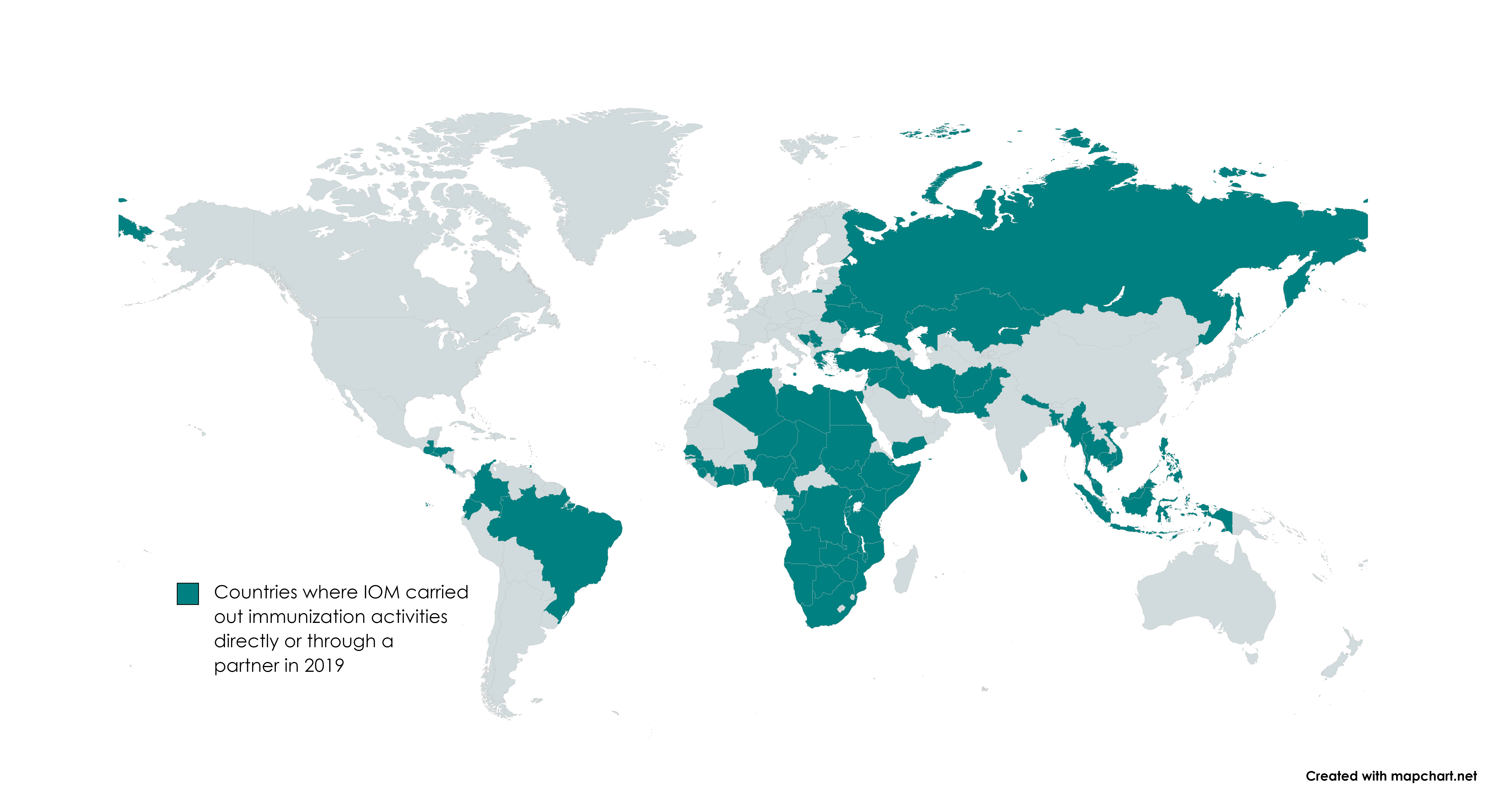-
Who we are
WHO WE AREThe International Organization for Migration (IOM) is part of the United Nations System as the leading inter-governmental organization promoting since 1951 humane and orderly migration for the benefit of all, with 175 member states and a presence in 171 countries.
-
Our Work
Our WorkAs the leading inter-governmental organization promoting since 1951 humane and orderly migration, IOM plays a key role to support the achievement of the 2030 Agenda through different areas of intervention that connect both humanitarian assistance and sustainable development.
What We Do
What We Do
Partnerships
Partnerships
Highlights
Highlights
- Where we work
-
Take Action
Take Action
Work with us
Work with us
Get involved
Get involved
- Data and Research
- 2030 Agenda
As countries the world over are launching mass COVID-19 vaccination campaigns, IOM stands ready to support national authorities and other international organizations in the roll-out, at the policy, technical and operational level. IOM calls on Governments to count and include all migrants present in their territories – regardless of legal immigration status – in national COVID-19 vaccine distribution plans, as no one will be safe until everyone is.
“Vaccines are one of our most important and cost-effective tools to prevent outbreaks, protect individuals, and therefore keep entire communities safe and healthy,” said IOM Director General António Vitorino.
In coordination with partners — national and local health authorities, the World Health Organization (WHO), the UN Children's Fund (UNICEF), and Gavi, the Vaccine Alliance, among others — for decades, IOM has been a key player in global efforts to ensure that people on the move, including refugees, asylum seekers, migrants in irregular situations, and hard-to-reach people such as internally displaced persons (IDPs) and vulnerable host communities, have proper access to vaccines. Protecting the most vulnerable from health risks is critical for everyone's safety.

-
IOM's vaccination footprint
-
Since its inception, the International Organization for Migration (IOM) has been working to improve immunization coverage for migrants and forcibly displaced persons across the world.
In 2019, IOM carried out vaccination activities in more than 74 countries, routinely, as part of national mass vaccination campaigns or in response to outbreaks. IOM provides vaccinations either directly or through reliable external providers. The Organization’s vaccination efforts span three major areas of focus:
- Global vaccine procurement and introduction of new vaccines
- Improving vaccine coverage and equitable access for migrants and people in crisis
- Strengthening national immunization systems
Depending on contexts, in 2019, IOM performed immunizations against more than 20 vaccine-preventable diseases: cholera, diphtheria, Haemophilus influenzae type b, hepatitis A, hepatitis B, human papillomavirus, influenza, Japanese encephalitis, measles, meningitis, mumps, pertussis, pneumococcal infection, polio, rotavirus, rubella, tetanus, tuberculosis, varicella and yellow fever.
In emergency settings, in 2019, more than 380,750 children were vaccinated against polio and/or measles. As part of IOM’s pre-migration health activities, over 445,800 vaccination doses were administered to close to 181,350 migrants and refugees in the process of migration on behalf of a variety of receiving countries, including Australia, Canada, Finland, Germany, Ireland, Italy, Japan, Malaysia, New Zealand, Spain, the United Kingdom and the United States of America.
- IOM's vaccination resources
-
Reports:
- Migrant inclusion in COVID-19 Vaccination Campaigns – March 2022 Update
- Migrant Inclusion in COVID-19 Vaccination Campaigns – December 2021 Update
- Migrant Inclusion in COVID-19 Vaccination Campaigns: IOM Country Office Review, September 2021
- Migrant Inclusion in COVID-19 Vaccination Campaigns: IOM Country Office Review, May 2021
Infosheets:
- Vaccination Services in IOM Migration Health Assessment Programmes EN | FR | ES
- IOM Migration Health Assessment Programmes - Response to COVID-19
- Emergency Health - 2019 Global Highlights
COVID-19 Analytical snapshots:
- IOM's key partnerships for immunization coverage
-
The International Organization for Migration is:
- A formal partner of the World Health Organization (WHO)
- A formal partner of the UN Children's Fund (UNICEF)
- A formal partner of Gavi, the Vaccine Alliance
- A member of the Global Outbreak Alert and Response Network (GOARN)
- A member of the Strategic Advisory Group of the Inter-Agency Standing Committee’s (IASC) Global Health Cluster
Countries where IOM provided vaccinations directly or through a partner (2019)










